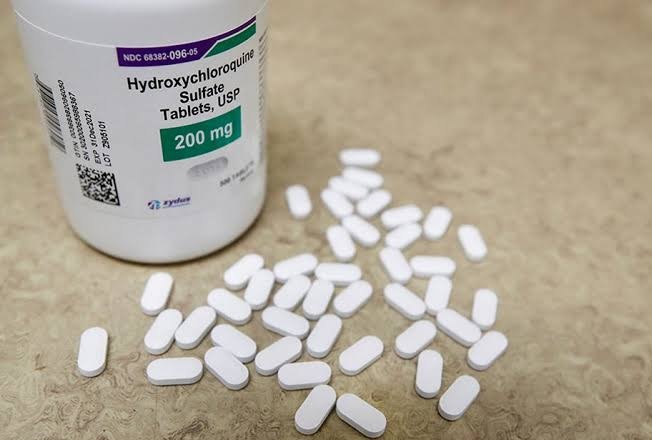New Delhi (NVI): The antimalarial drug Hydroxychloroquine (HCQ) has helped COVID-19 patients survive better, according to a new study.
A team at Henry Ford Health System said their study of 2,541 hospitalized patients found that those given Hydroxychloroquine were 50 percent less likely to die of the brutal infection than those who did not receive the drug, the CNN reported.
Division head of Henry Ford Health System, Dr Marcus Zervos, said 26 per cent of those not given Hydroxychloroquine died, compared to 13 per cent of those who got the drug. The team looked back at everyone treated in the hospital system since the first patient in March, the report said.
According to the new study, published in the International Journal of Infectious Diseases reports, “Overall crude mortality rates were 18.1 per cent in the entire cohort, 13.5 per cent in the Hydroxychloroquine alone group, 20.1 per cent among those receiving Hydroxychloroquine plus Azithromycin, 22.4 per cent among the Azithromycin alone group, and 26.4 per cent for neither drug,”
The Henry Ford team monitored patients carefully for heart problems. “The combination of Hydroxychloroquine plus Azithromycin was reserved for selected patients with severe COVID-19 and with minimal cardiac risk factors,” the team wrote.
The team said they believe their findings show hydroxychloroquine could be potentially useful as a treatment for coronavirus, the CNN report said.
“It’s important to note that in the right settings, this potentially could be a lifesaver for patients,” Dr. Steven Kalkanis, CEO of the Henry Ford Medical Group, said at the news conference.
However, it is a surprising finding because several other studies have found no benefit from Hydroxychloroquine, a drug originally developed to treat and prevent malaria, mostly in countries like India.
It comes after several large-scale studies found no benefit from the malaria drug, touted by US President Donald Trump, which prompted the US Food and Drug Administration (FDA) to revoke its emergency use authorization for the drug including trials sponsored by the World Health Organization and the National Institutes of Health, were halted.
But later studies found not only did patients not do better if they got the drug, they were more likely to suffer cardiac side effects
Meanwhile, researchers not involved in the Henry Ford study pointed out it wasn’t of the same quality of the studies showing hydroxychloroquine did not help patients, and said other treatments, such as the use of the steroid dexamethasone, might have accounted for the better survival of some patients, the CNN said.
“Our results do differ from some other studies,” Zervos told in a news conference. “What we think was important in ours … is that patients were treated early. For hydroxychloroquine to have a benefit, it needs to begin before the patients begin to suffer some of the severe immune reactions that patients can have with Covid,” he added.
Steven Kalkanis, chief executive officer of the Henry Ford Medical Group said that their findings do not necessarily contradict those of earlier studies. “We also want to make the point that just because our results differ from some others that may have been published, it doesn’t make those studies wrong or definitely a conflict.”
“Much more work needs to be done to elucidate what the final treatment plan should be for Covid-19,” adding that Hydroxychloroquine can help interfere with the virus directly and also reduces inflammation.
However, researchers who were not involved with the study were critical. They noted that the Henry Ford team did not randomly treat patients but selected them for various treatments based on certain criteria.
“As the Henry Ford Health System became more experienced in treating patients with COVID-19, survival may have improved, regardless of the use of specific therapies,” Dr Todd Lee of the Royal Victoria Hospital in Montreal, Canada, in a commentary that accompanied the study.
Likewise, the United Kingdom COVID-19 trial ends hydroxychloroquine study because there’s no evidence the drug benefits patients. As the Detroit paper excluded 267 patients — nearly 10 per cent of the study population —who had not yet been discharged from the hospital.
Both the Detroit and New York studies were observational, they looked back at how patients did when doctors prescribed hydroxychloroquine.
These observational studies are not as valuable as controlled clinical trials while considered the gold standard in medicine, patients in a clinical trial are randomly assigned to take either the drug or a placebo, which is a treatment that does nothing.
Two clinical trials on hydroxychloroquine for COVID-19, one in the US and one in the UK, were stopped early because their data suggested hydroxychloroquine wasn’t helpful.
The US trial, run by the National Institutes of Health, enrolled more than 470 patients while in UK trial, run by the University of Oxford, enrolled more than 11,000 patients.
According to Anthony Fauci, the director of the National Institute for Allergy and Infectious Diseases, science shows hydroxychloroquine is not effective as a coronavirus treatment.
“We have concluded that there is no beneficial effect of hydroxychloroquine in patients hospitalized with COVID-19,” the Oxford doctors concluded.
But a White House official praised the Henry Ford team’s study. Peter Navarro, the White House trade adviser, said the study shows hydroxychloroquine works if given early enough.
“This is a big deal. This medicine can literally save tens of thousands, perhaps hundreds of thousands of American lives and maybe millions of people worldwide,” he added.
-RJV








